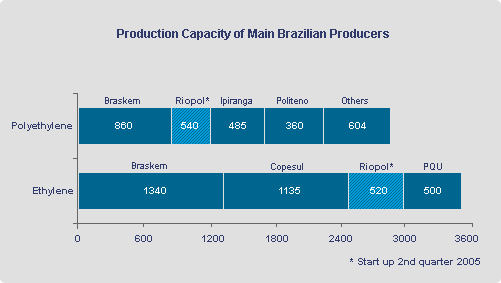
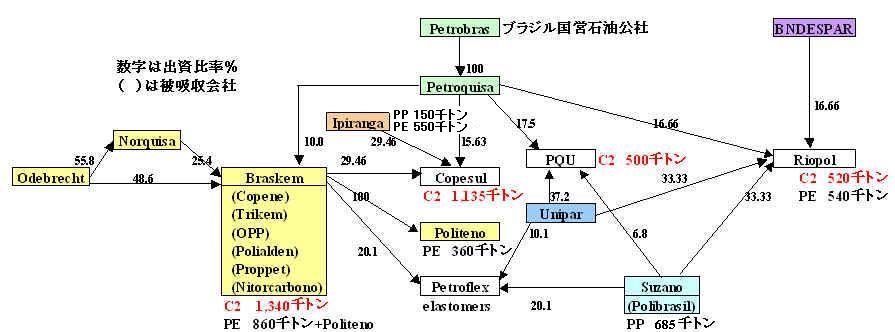
Braskem Politeno
OPP Polietilenos at
Triunfo manufactures polyethylene in two swing plants capable of
producing LLDPE and HDPE fromethylene supplied by COPESUL.

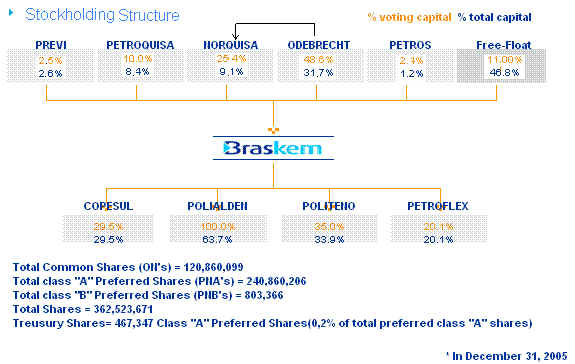

*1 Polialden HDPE 三菱化学、日商岩井が出資 → 両社株式売却
*2 Politeno
住友化学、伊藤忠が出資
*3 Ciquine 三菱化学、日商岩井が出資 → 両社株式売却
*4 BraskemがOPP,
Nitrocarbonoを吸収
*5 Trikem PVC 三菱化学、日商岩井が出資 → 両社株式売却
*6 BraskemがTrikemを吸収 (Odebrechtから分離)
Odebrecht/Mariani
がCentral BankからConepar株式63.82%を買収し、グループで100%保有
Copesul Located in Triunfo, a
county of the state of Rio Grande do Sul
Classified
as a large-size cracker, Copesul produces about 40% of ethylene consumed
in Brazil, nameplate capacity of 1.135
million
tons/year. Besides ethylene, its main product, Copesul
produces propylene, butadiene, benzene, toluene, xylenes,
MTBE, butene-1, propane, and others, a total of 3
million
tons per year of petrochemicals. More than 80% are consumed
in South Petrochemical Complex. Remaining products are sold
to other Brazilian states or exported.
Copesul was privatized
in 1992
|
| Ipiranga
Group |
29,46 % |
|
| Braskem Odebrecht
Group |
29,46% |
|
| Petroquisa |
15,63% |
|
| Others* |
25,45% |
|
| * Banks,
pension funds, other investors. |
Suzano
Petroqui'mica
Latin American leader
in the production of polypropylene resins and the 2nd largest
producer of thermoplastic resins in Brazil.
The Company has a
production capacity of 625
thousand tons/year of polypropylene distributed within its
three facilities located in Maua (State of Sao Paulo),
Duque de Caxias (State of Rio de Janeiro) and Camacari
(State of Bahia).
2005/9/1 Polibrasil をBasell から買収
total production capacity
of 625 kton/year of polypropylene and 25 kton/year of
compound polypropylene. The agreement also
encompasses the simultaneous sale to
Basell of the totality of the polypropylene compounding
business of Polibrasil.
Facilities
(Polypropylene Resins) |
Installed
Capacity
(thousand ton/year) |
after
expansion
(thousand ton/year) |
Duque
de Caxias
|
200.0
|
300.0
|
Maua'
|
300.0
|
450.0
|
Camac,ari
|
125.0
|
125.0
|
Total
|
625.0
|
875.0
|
Suzano Petroquimica
is a joint controlling
shareholder of Riopol and Politeno, polyethylene producers, and Petroflex, synthetic elastomer producer;
both products are raw materials for the converters, as the
polypropylene (more details at Suzano´s Groups section).


Riopol http://www.chemicals-technology.com/projects/rio/
Riopol was created in
1996 to implement a grand project, the Rio de Janeiro
Gas-Chemical Production Complex, in the vicinity of the Duque
de Caxias refinery - Reduc, owned by Petrobras. The Complex
was inaugurated on 23 June, 2005 and is comprised of two units
- an ethane and propane pyrolysis unit, with installed
capacity of 520 thousand ton/year of
ethylene,
and another unit producing high density
(HDPE) and low density (LLDPE) polyethylene, with installed
capacity of 540thousand ton/year.
Rio Poli'meros'
Pyrolysis Unit has an annual production capacity of 520.0
thousand tons of ethylene and 75.0 thousand tons of
propylene.
Additionally, this unit has an annual production capacity
of 5.0 thousand tons of hydrogen and 33.0 thousand tons
of pyrolysis gasoline.
The Polymerization unit, on the other hand, has two
independent production lines with an annual capacity of 270.0
thousand tons of polyethylenes each, for a total annual
capacity of 540.0 thousand tons of polyethylene. This unit is of the
swing type, capable of producing LLDPE and HDPE. This
flexibility allows for adapting the product mix to the
needs of the market.
The Rio de Janeiro
Gas-Chemical Production Complex is the first Brazilian
petrochemical complex to use natural gas fractions as
petrochemical raw-material to manufacture ethylene and the
first integrated petrochemical project in Brazil, gathering
production units of ethylene and polyethylene.
The shareholders of Riopol are Suzano
Petroqui'mica (33,33%), Unipar (33,33%), Petroquisa (16,66%)
and BNDESPAR (16,66%).
PQU
PQU, Brazil's first
basic petrochemical products plant, was incorporated December
12, 1966 under the name Petroqui'mica Unia~o Ltda.,
From 1971 onward,
PQU's shareholder body was composed by 90% of
domestic capital, from Petrobras (Petroquisa 17.5%) and
Unipar(37.2%), a domestic private group(Suzano 6.8%), and 10%
of foreign capital, from companies such as
International Finance Corporation, Provident International
Corporation, Citicorp, and Venture Capital Ltd.
In November 1980, the
DBN I (Debottlenecking) project was completed, increasing
ethylene production from 300 thousand to 360 thousand tons
per year. now 500
Ipiranga
Ipiranga Petroquimica
produces four thermoplastic resins present in several
day-by-day products.
The High, Medium and Linear Low Density Polyethylenes (HDPE,
MDPE and LLDPE), besides Polypropylene (PP), are produced in
the five industrial plants in the Petrochemical Complex of
Triunfo-RS.
Ipiranga Petroquimica was founded in 1976 and it was first
called Polisul Petroquimica. Hoechst
(Germany), Petroquisa (state owned company) and Empresas
Petroleo Ipiranga (one of the largest private
company in Brazil) were the only Polisul shareholders.
It was in 1992 that Ipiranga and Hoechst bought
Petroquisa's shares, taking over the control of
Polisul. By that time, each shareholder had 50% of the
company.
By the year 1997, Hoechst shareholders decided to focus their
investments in science and health business. That was the
opportunity when Ipiranga bought Hoechst shares and the name Polisul
Petroquimica was changed to Ipiranga Petroquimica (now 100%
owned by Empresas de Petroleo Ipiranga).
The petrochemical site of Triunfo (South Brazil) has many
companies but Ipiranga was the first one to start up in 1982
(together with the cracker - COPESUL). It first began with a
HDPE 60.000 ton/year capacity.
In 1986, the industrial plant was debottlenecked in order to
produce 100.000 ton/year.
In 1990, a second industrial plant was built and it raised
the HDPE production capacity to 220.000 ton/year.
The third unit to start up was built in 1996, reaching
350.000 ton/year HDPE production capacity.
The 150.000 ton/year PP plant and the 150.000 ton/year
HDPE/LLDPE swing plant started producing in 1999.
In its Brazilian site (Triunfo), Ipiranga is able to produce 150.000
ton/year of PP, 400.000 ton/year HDPE and 150.000 ton/year
HDPE/LLDPE in its five (05) petrochemical units.
Unipar
The birth of UNIPAR
is entwined with the origin of the petrochemical industry in
Brazil, ? and consequently with an important part of the
country’s History.
When the Federal
Government opened up the importation and processing of crude
oil to private enterprise, Refinaria União was a pioneering enterprise
which, for two decades, became a landmark not only because it
processed 20,000 barrels per day and employed the most modern
technology in the sector, but especially because it trained
hundreds of high-level technicians in specialties that had
not existed in Brazil up to that time.
It was these new
professionals who employed all their knowledge in the
installation of the first Petrochemical Complex in Brazil, a
successful enterprise of the União Group, which would later
give rise to UNIPAR-União de Indústrias Petroquímicas S.A. With the inauguration of
Petroquímica União (PQU), in São Paulo, Brazil started
producing ethylene, propylene and other raw materials for
second generation industries. In addition to Petroquímica União(PQU), Poliolefinas,
Carbocloro, Empresa Brasileira de Tetrâmero, Brasivil-Resinas Vinílicas and Copamo-Consórcio Paulista de Monômero were part of UNIPAR’s very significant initial
assets.
Meanwhile, UNIPAR has
become a Group of ten distinct businesses and a listed
corporation, which, among other projects, is taking part in
the installation of the first Gas-Chemical Complex in Brazil:
Rio Polímeros, in Duque de Caxias,
State of Rio de Janeiro, which is expected to start up in
2004.
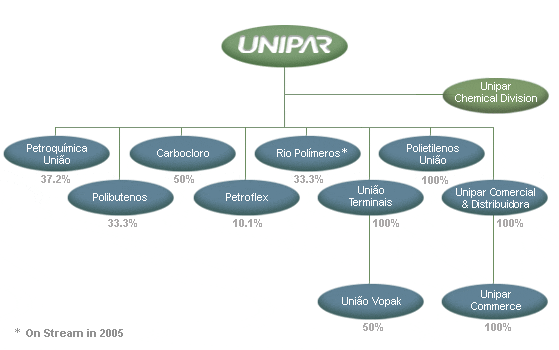
Carbocloro
Hydrochloric
acid, liquid chlorine, EDC, sodium
hypochlorite, caustic soda,
Petroflex BR、SBRほか
Polietilenos
Uniao EVA LDPE
Chevron Phillips
Chemical's proprietary loop slurry PE technology will be
employed in a new 200,000 metric tons per year reactor
that is part of Polietilenos Uniao's strategic PE
expansion at its plant in Santo Andre, Sao Paulo, Brazil.
The facility is expected to startup in 2007.
The new plant
which will produce HDPE/LLDPE and will go onstream by mid
2007, more than doubling Polietilenos União's PE capacity. (2005/1)
Petroquímica União PQU
Unipar's expansion project
is to increase the installed capacity of the ethylene
plant at subsidiary Petroquimica Uniao (PQU) by 200,000
tons a year (t/y) to 720,000t/y.
The expansion would
reportedly need 350,000t/y of gas and 200,000t/y of
naphtha, which Petrobras should be able to provide from
its Recap (Capuava) and Revap (Henrique Lage) refineries.
Rio Polímeros Piopol
| Company |
Main
Products |
Final
Uses |
UNIPAR
Chemical Division |
Cumene
Olefins
Isoparaffins |
Resins and Fibers
Industrial Detergents
Solvents |
| Polietilenos União |
LDPE
EVA |
Plastic Packages and
Articles
Footwear |
| Petroquímica União |
Ethylene
Propylene
Benzene
Butadiene
Orthoxylene
Gasoline |
Plastics and Resins
Resins and Fibers
Fibers and Anhydrides
Rubbers
Anhydrides and Plasticizers
|
| Carbocloro |
Chlorine
Soda
EDC |
Water treatment and in
the Chemical, Steel, and Pulp & Paper Industries
PVC |
| Petroflex |
Synthetic Rubbers |
Tyres
Rubber Articles |
| Polibutenos |
Polyisobutenes |
Lube Additives |
| Rio Polímeros |
LLDPE
HDPE |
Plastic Packages and
Articles |
Petroquisa Petrobras Quimica S/A
Petrobras
Exploration & Production
Natural Gas
Energy
Refining
Transportation and Storage
Distribution
Petrobras Quimica S.A - Petroquisa
PETROQUISA, Petrobras subsidiary, was incorporated by Decree
no. 61.981, dated December 28, 1967, to develop and
consolidate the chemical and petrochemical industry in
Brazil. The purpose of the company is to participate in
companies operating in the manufacture, trade, distribution,
transportation, import and export of chemical and
petrochemical products, in general. Moreover, it can perform
all the aforementioned activities directly. After its
incorporation, three petrochemical complexes
were built - in Sao Paulo, Bahia and Rio Grande do Sul.
PETROQUISA is present in the three Brazilian petrochemical
centers, through its holdings in BRASKEM,
Petroquimica Uniao (PQU), and COPESUL, companies responsible for the
production (from naphtha, a petroleum byproduct feedstock for
the petrochemical industry) of basic petrochemical products
(ethylene, propane, benzene, etc), feedstock for second
generation plants to manufacture other products (plastics,
rubber, etc.) used by state-of-the-art industries in
manufacturing articles for public consumption (packaging,
tires, etc.).
PETROQUISA also has interest in six other operational firms,
as well as in Rio Polimeros S.A., affiliate responsible for
the Rio de Janeiro Chemical Gas Complex, a project under
construction next to Duque de Caxias refinery in Rio de
Janeiro.
| COMPANY |
PRODUCT |
VOTING
CAPITAL% |
TOTAL
CAPITAL% |
| Braskem S.A.
|
Basic,
intermediate and fi nal petrochemicals |
10.0 |
8.4 |
| Cia.
Petroquimica do Sul - Copesul |
Basic
petrochemicals |
15.6 |
15.6 |
| Petroquimica
Uniao S.A. |
Basic
petrochemicals |
17.5 |
17.4 |
| Metanol do
Nordeste - Metanor S.A |
Methanol |
49.5 |
33.4 |
| Deten
Quimica S.A. |
Linear
alkylbenzene |
28.6 |
27.5 |
| Fabrica
Carioca de Catalisadores S.A. |
Catalyzers |
50.0 |
50.0 |
| Petrocoque
S.A. Industria e Comercio Calcinated |
petroleum
coke |
35.0 |
35.0 |
| Petroquimica
Triunfo S.A. |
Low density
polyethylene |
70.5 |
85.0 |
| Rio
Polimeros S.A. (Riopol) |
Polyethylene |
16.7 |
16.7 |
Petroquimica
Triunfo
In
May, Petroquisa exercised its preemptive right to acquire the
shares held by Primera (part of the Dow-Quimica group) in
Petroquimica Triunfo’s capital. On
the conclusion of this operation, Petroquisa’s stake in the
voting capital was increased from 45.22% to 60.63% and
corresponding to 80.07% of Petroquimica Triunfo’s total
capital. Petroquisa disbursed approximately US$ 25.5 million
for this additional stake.
Subsequently, Petroquisa acquired the remainder of Primera’s stake in the
company given that the other partner, petroplastic, decided
not to exercise its preemptive rights.
As a result, Petroquisa’s final
participation in the company was increased to 70.45% of the
voting capital and to 85.04% of the total capital, the
company disbursing a further US$ 32 million.
Rio
Polimeros S.A. (Riopol) a company owned by Suzano
(33.3%), Unipar (33.3%), Petroquisa (16.7%) and BNDESPar
(16.7%), is concluding the construction of a new
petrochemicals plant in Duque de Caxias, state of Rio de
Janeiro.
With operations scheduled to come on stream in the fi rst
half of 2005, Rio Polimeros will have an annual production of
515 thousand tons of polyethylene with various specifications
and 76 thousand tons of propene, using as raw materials
ethane and propane extracted from Campos Basin natural gas.
The total investment is estimated at US$ 1 billion
BNDESPAR.
Banco
Nacional de Desenvolvimento Economico e Social Participacoes
the private-sector
investment arm of Brazil's National Development Bank, BNDES,
Petroflex Duque de Caxias (RJ), Triunfo (RS)
e Cabo (PE)
Largest producer
in Latin America, and sixth in the world, Petroflex holds
today approximately 80% of market share in the Brazilian elastomers market. It has 3
industrial units: Duque de Caxias, State of Rio de
Janeiro; Triunfo, State of Rio Grande do Sul and Cabo,
State of Pernambuco, all certified by ISO 9001, ISO 14001
and OHSAS 18001 standards, amounting to a total installed
capacity of 410 thousand ton/year. Petroflex exports
approximately 30% of its production to over 70 countries.
Petroflex
offers more than 70 types of elastomers produced with
raw materials from oil byproducts. Its products
include synthetic ESBR, SSBR and BR rubbers,
thermoplastic TR rubber, synthetic latex, PBLH and
nitrilic NBR rubbers.
| Units |
Installed
Capacity
(thousand tons/year) |
Duque de
Caxias
|
210.0
|
Triunfo
|
76.0
|
Cabo
|
125.0
|
Total
|
411.0
|
Created by
Petrobras in 1962, Petroflex was the first petrochemical
company to be privatized in Brazil, in 1992, as part of
the National Privatization Program (PND). Petroflex is controlled
by Suzano Petroqui'mica(20.1%), Braskem(20.1%)and
Unipar(10.1%),
which hold, together, 50.3% of the total capital.
March 31, 2014
Synthos announces its plan to invest
in Brazil
Synthos S.A. is planning
to build a neodymium polybutadiene rubber plant in Triunfo Petrochemical
Complex in Rio Grande do Sul.
Synthos
S.A. is planning to build a
neodymium
polybutadiene rubber plant in
Triunfo Petrochemical Complex in Rio
Grande do Sul. The investment
will be carried out provided that the
2013 contracts on raw material supplies
will come into effect.
Upon the implementation of those
contracts, the company will build a
modern production plant producing
neodymium polybutadiene rubber (NdBR)
used to manufacture high-performance car
and truck tires and various technical
rubber products. The plant capacity will
reach 80,000
tonnes per year, which will
result in a huge production growth of
elastomers in Brazil and will replace a
significant part of the current import.
“Considering the growing demand for
synthetic rubber in Brazil and other
South American countries, we will not
aim at replacing the local production,
but try to substitute the import into
the region,” said Tomasz Kalwat,
CEO, Synthos S.A.
The production of polybutadiene rubber
in Brazil will be based on the
license granted by Michelin.
2013/6/26
Michelin とChandra Asri 、インドネシアに合成ゴム製造JV設立
Synthos has signed contract agreements
with tire manufacturers Michelin and
Pirelli regarding the
supply of NdBR to their facilities in
Brazil.
The time remaining until the
implementation of contracts will be
dedicated to the preparation of the
necessary documentation (including
project documents) without incurring
substantial financial liabilities.
Brazil is the world’s seventh economy
and the largest economy in South
America. It is one of the emerging
markets with high growth potential.
Synthos S.A. continuously emphasises its
presence on that market. In 2012, our
rubber export to South America amounted
to 3.3%, and in 2013 it reached 6.3%.
According to the Polish Foreign Market
Research Lab, in the first three
quarters of 2013, the sales of tires for
new cars in Brazil increased by 9%. The
replacement tires market increased by
11% as compared to the previous period.
Thus, the Brazilian market and other
South American economies are highly
attractive.
ーーーーーーーーー
Synthos
S.A. is one of the largest manufacturers of chemical raw materials
in Poland, as well as being Europe’s
No. 1 manufacturer
of rubber emulsions and third largest manufacturer of polystyrene for foaming
applications. Synthos S.A. was established on the basis of Firma Chemiczna Dwory
S.A. and Kaucuk a.s.
旧称 Dwory で、チェコのKaucuk買収後、改称した。
October 5th, 2008 -
Dwory S.A. sign a licensing contract with the
Michelin company for the purchase of polybutadiene
rubber production technology.
At the same time, a commercial contract for deliveries of this type of
rubber to Michelin is signed for a period of at least seven years from the
start of production. Polybutadiene rubbers produced according to the
neodymium technology purchased from Michelin
are among the newest generation of rubbers used to produce tires with
improved safety standards, including tires made for higher speeds.
October 23rd, 2007 – The
Chemical Company changes its name to Synthos S.A.
The assumption of a new name is an effect of organizational changes
related to the finalization of the acquisition process
of the Czech company, Kaucuk a.s.
SynthosRubbers
Synthos S.A. is one of the
world’s largest manufacturers of synthetic rubber. The company is
the largest European manufacturer of styrene butadiene rubber (ESBR),
and also offers neodymium polybutadiene rubber (NdBR), the
production of which started in 2011, and high styrene rubber (HSR).
In 2012, a contract was signed with Goodyear for the license of
production of solution styrene butadiene rubber (SSBR) to start in
2015. The NdBR and SSBR rubber is used for production of
high-performance tires, so called green tires.
Production of
NdBR polybutadiene rubbers begins in
the III quarter of 2011 in Kralupy. Production is carried out using
a neodymium catalyzer. Production capacity amounts to 80 thous. tons
per year.
In June, 2012, a licensing
contract is signed with The Goodyear Tire &
Rubber Company, the object of which is for Goodyear to grant
access to advanced SSBR rubber
production technology. The start-up of a production unit operating
based on the acquired technology is planned for 2015.
In 2013, The construction of the SSBR rubber installation is started
at Synthos Dwory. The cost of the investment will amount to 568 mln
PLN, out of which 147 mln PLN will constitute financing from EU
funds.
SynthosEPS
Synthos S.A. is
a leading producer of
EPS in Europe.
Expandable polystyrene (PS-E or EPS) is a polymer compound
containing pentanes allowing expansion. EPS may contain
additives enhancing the processing or giving the foam
specific properties. These are fire-retardants, agents
reducing heat transfer and water absorption, external
lubricants for enhanced processing, colourants etc.
SynthosXPS
押出 発 泡 ポリスチレン
The XPS extruded
polystyrene is characterised by very good thermal
insulation, resistance to humidity impact and high strength.
Based on its long-time experience in the field, Synthos S.A.
has created an entirely new product – Synthos XPS, based on
extruded polystyrene.
Synthos XPS is a
homogeneous construction material, characterised by a smooth
surface and a structure made of small, closed cells. This
structure makes it an ideal product for numerous
heat-insulating applications.
SynthosPS
Polystyrene products delivered
under the trade name SYNTHOS PS are manufactured in the continuous
block polymerisation process at Synthos Dwory and SYNTHOS Karlupy
a.s. in the Czech Republic. Synthos S.A. manufactures and offers
polystyrene of high quality and stability.
SynthosSpecialties
OSAKRYL®, WINACET®
are market brands of water dispersions produced by
Synthos S.A. The Winacet® group includes mostly
vinyl acetate-based dispersions, while the Osakryl®
group includes acrylic and styreneacrylic products
as well as acrylic monomer copolymers with other
monomers. At present, the portfolio of Synthos water
dispersions satisfies the needs of broadly
understood construction chemicals manufacturers,
i.e. manufacturers of paints, plasters, primers,
putties, including decorative putties (stucco),
adhesives and many other products.
SynthosAdhesives
Synthos Adhesives is a
division of Synthos S.A., the leading European manufacturer
of chemicals.
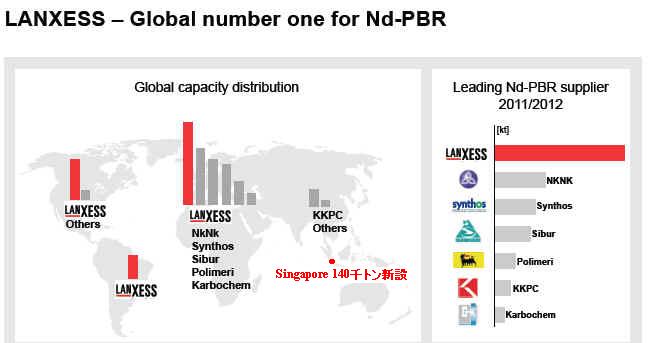
NKNK(Nizhnekamskneftekhim)
is one of the biggest producers and exporters of petrochemical products
in the Russian Federation.
KKPC:Kumho
Petrochemical
SIBUR Group
はGAZPROMが100%出資するロシア最大の垂直統合石油化学会社
Polimeri Europa:ENI
100%
Karbochem
(Pty) Ltd is a South African manufacturer of various types of synthetic
rubber








